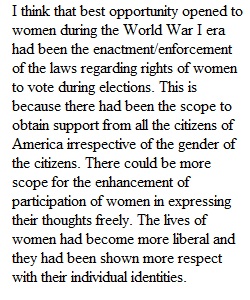


Q In April 1915, before America’s entrance into the war, more than one thousand women from warring and neutral nations attended an International Congress of Women for Peace and Freedom in The Hague, Netherlands. In 1920, the nineteenth amendment was approved. Women’s roles were changing, and continued to change throughout the war. To complete your discussion assignment, please do the following: • In one to two paragraph post, answer the following questions: o What do you believe was the best new opportunity, right, or liberty that opened to women during the World War I era? o How did this change or development change women’s lives or their daily experience? o After the war, did these changes have a long-term impact on gender roles in American society? Discuss the benefits and drawbacks of the opportunity, right, or liberty you identified above. • When you are done, post your paragraphs to the discussion forum. Respond to at least two of your peers. Do you agree with the long-term impact suggested in their posts? Discuss what might have stifled or encouraged that effect over time. Support your answers with additional sources.
View Related Questions